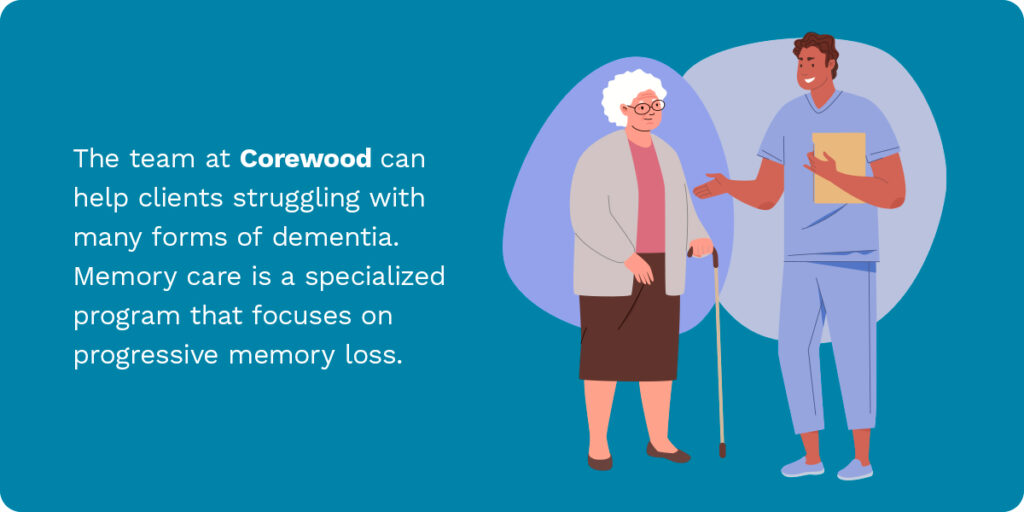Alzheimer’s vs. Dementia Care
Watching a family member mentally decline is a difficult experience. Personalized home care from a professional caregiver can ease this experience, ensuring you have the tools to help your parent or spouse live their life with grace and dignity.
Dementia and Alzheimer’s disease are two main types of mental decline that families must often face. While some refer to these two conditions interchangeably, they do have some differences. This is especially apparent in the type of personal home care services clients require. Read on to learn how the private caregivers at Corewood Care approach memory care vs. Alzheimer’s care.
How Dementia and Alzheimer’s Disease Differ
Dementia is not a disease — it is a general term that refers to mental decline that interferes with a person’s daily life. Dementia is not a normal part of growing older. Rather, it’s usually caused by a specific condition that damages brain cells, impacting thoughts, behaviors and feelings. The condition is usually identified by its symptoms, which include some or all of the following:
- Memory loss
- Confusion
- Difficulty understanding others
- Changes in behavior
- Growing need for help with daily tasks
- Problems gathering thoughts or finding the right words for situations
Many types of dementia exist. However, 60% to 80% of dementia cases are identified as Alzheimer’s disease. Also referred to simply as Alzheimer’s, this condition is a progressive brain disease and a form of dementia. In many cases, the condition is present for some time before an individual begins to show symptoms.
As Alzheimer’s progresses, the more general hallmarks of dementia grow in severity and require specialized caregiving. Symptoms of later-stage Alzheimer’s include:
- Delirium
- Disorientation
- Disturbing behavior changes
- Inability to communicate
- Difficulty swallowing
- Mobility problems
- Incontinence
How Is Alzheimer’s Care Different From Dementia Care?
Eventually, Alzheimer’s disease causes so much damage to the brain that a person requires 24-hour care. Therefore, it’s essential to understand the difference between memory care and Alzheimer’s care.
Dementia Care

Dementia care is often the first step before symptoms become too severe. The team at Corewood can help clients struggling with many forms of dementia. Memory care is a specialized program that focuses on progressive memory loss. As such, clients in dementia care can expect adaptable services depending on their unique needs.
Beyond companionship and assistance with ADLs (activities of daily living), we work to create a familiar setting that contributes to our clients’ emotional and cognitive well-being. The goal is to help individuals struggling with symptoms maintain some level of independence. We provide dementia care clients with the following:
- Activities that benefit physical, cognitive and emotional health
- Mobility assistance
- Physical safety measures to account for wandering or confusion
- Medication management
- Transportation services
- Prompt appointment and medical reminders
- Medical services when needed
Alzheimer’s Disease Care
In the later stages of Alzheimer’s, new challenges require a more intentional form of care. Alzheimer’s care services focus on maintaining a client’s quality of life and mitigating the impact of the disease. The intense needs of people with Alzheimer’s require specialized training. Our caregivers have the skills to provide all the services mentioned above, with the addition of the following:
- Hygiene and continence care
- Long-term planning
- Crisis prevention
- Family counseling
Specialized Care for Dementia and Alzheimer’s Disease at Corewood Care
At Corewood Care, we specialize in creating personalized care plans based on a client’s needs. From mild dementia symptoms to late-stage Alzheimer’s disease, our caregivers help clients age in place in the comfort of familiar surroundings. Schedule a free assessment to determine which treatment program is right for your situation.



